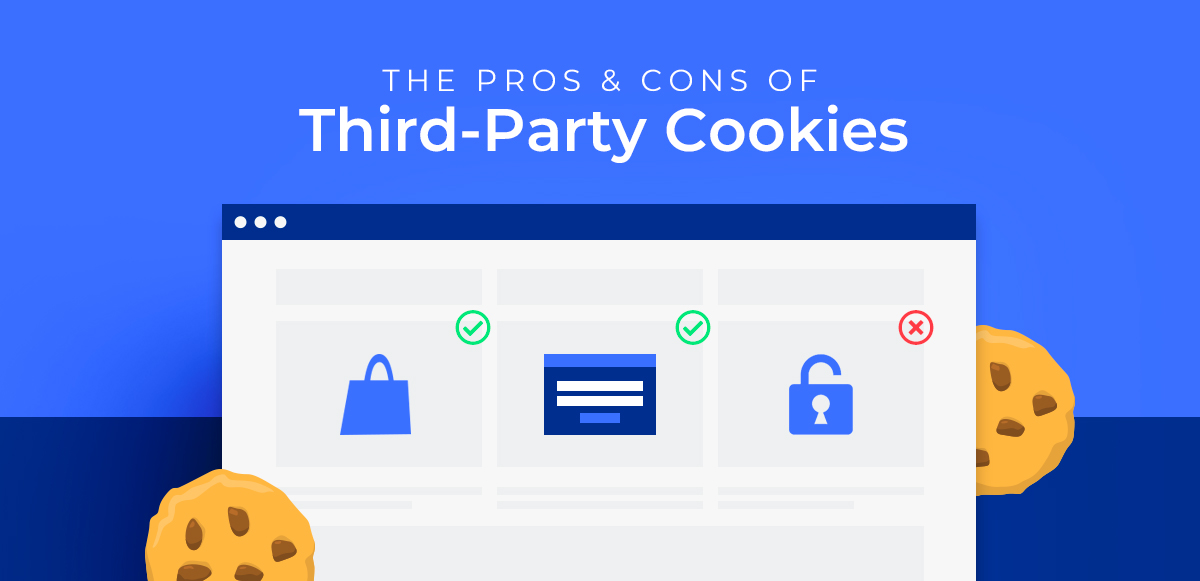
Third-party cookies are not originated from the website operator, but from a third party including an advertiser. If you visit for the website at first time, the web server usually generates a so also called first-party cookie, which stores all the necessary settings or inputs for the user.
Third-party cookies are hosted by an advertiser's server (ad server) and primarily record for the user's behavior and path on the internet in order to subsequently create a user profile. On the basis of this user profile, it’s then possible to display personal adverts for the user. Third-party cookies are powerful online marketing tools and frequently referred to as tracking cookies and targeting cookies.
There are two different types of cookies on the internet. There are first-party cookies and third-party cookies.
Either these cookies observe user behavior. But there are major differences between who uses them and what they are used for.
First-party cookies are placed on the website by the owner. They collect user data and use it to remember website configuration. First-party cookies enable the owner for the website to provide a better user experience.
They track and remember things such as:
Third-Party Cookies
Third-party cookies are also known as tracking cookies and targeting cookies. They are placed on a website by someone other than the website owner. They are set up by a third party, thus the name.Third-party cookies track for the same information as first-party cookies, sometimes more. All the tracked information goes to the third party. But third-party cookies aren’t there to provide a better user experience. They are mostly used for advertising purposes. Third-party cookie data identifies users online or reveals of their likes and dislikes. It provides powerful information useful in enhancing online marketing.
Information that third-party cookies such as
Online advertising is the most common use of third-party cookies. It’s use the data to create user profiles and present personalized ads. Third-parties can add cookies to a webpage through tags. These tags are sometimes connected to an advertisement but not always.
What are the pros and cons of third-party cookies?
Cookies are usually only helpful for the users in the form of first-party cookies, as these are primarily responsible for user comfort. Third-party cookies are powerful tools, especially for advertisers, with which they can generate targeted advertising. The advantages and disadvantages of third-party cookies for the parties involved such as:
Advantages for users
Many web browsers allow third-party cookies to be blocked, if required
Personalized advertising makes the internet seem more individualized
Interests traced by third-party cookies generate suitable advertisements
Website operators must be transparent with regard to cookie usage
Advantages for website operators
Visitors see relevant advertising that motivates them to click on an ad. To increases advertising revenue
Technically easy to implement: the work is done by the ad server
The advertisements in question aren’t hosted on your own server.
Simple and more efficient than tracking for the first-party cookies
Enables the wide range of methods for online marketing
Disadvantages for users
The cookies read personal data that enables personalized advertising; questionable and controversial under data protection law
Legalities are always changing and need to be on top of the most current legislation
Text ads with notices on cookie usage are often annoying
Controversies over third-party cookies can cause website visitors to mistrust your site.
Disadvantages advertisers
Website operators have to inform visitors about the use of cookies through text ads, some of which are annoying to many users
Unstable legal situation may soon force strategic reorientation and application of other technologies
Controversies over third-party cookies can damage the relationship for trust with website operators; some operators move away from third-party cookies
Third-party cookies used
Third-party cookies are used for web analytic purposes. This can web browser loads an advertisement and also known as targeting pixel that isn’t hosted on the server for the visited website. However, this third party cookie reads all the information that the first-party cookie notes anyway and sometimes even more. Your web browser generates an additional cookie, the third-party cookie, because it is not assigned to the server of the website, but to that of the advertiser.
The web analysts are primarily interested for the user behavior; the third-party cookie usually documents the page history on a website. Nevertheless, this cookie often gains really valuable data only when it “recognizes” for another website. Since your web browser communicates again with the same ad server, it can trace your path on the internet, and not only that: your behavior on the web reveals a lot of interests and your consumer behavior. This creates a user profile that enables targeted and personalized advertising.
What kinds of data do third-party cookies collect, and why?
Third-party cookies collect the following relevant data in particular:
If this data is collected across websites, an individual user profile can be created that enables personal advertising. Online marketing uses third-party cookies in particular for targeting, tracking, and retracking.
Lorem ipsum viverra feugiat. Pellen tesque libero ut justo, ultrices in ligula. Semper at. Lorem ipsum dolor sit amet elit. Non quae, fugiat nihil ad. Lorem ipsum dolor sit amet. Lorem ipsum init dolor sit, amet elit. Dolor ipsum non velit, culpa! elit ut et.
Lorem ipsum dolor sit amet elit. Velit beatae rem ullam dolore nisi esse quasi, sit amet. Lorem ipsum dolor sit amet elit.